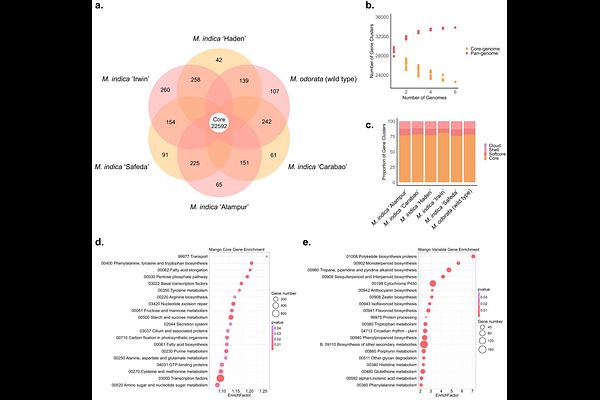Pangenome analysis provides insights into the evolution of mango (Mangifera spp.)

Pangenome analysis provides insights into the evolution of mango (Mangifera spp.)
Li, J.; Michael, V. N.; Simpson, S. A.; Youngblood, R. C.; Scheffler, B. E.; Crane, J. H.; Chen, S.; Hulse-Kemp, A. M.; Wu, X.
AbstractMango (Mangifera spp.) is a major tropical fruit crop of global economic importance, but advanced genomic resources are needed to support its breeding, conservation, and sustainable cultivation. In this study, a mango pangenome was constructed using high-quality, telomere-to-telomere genomes of four cultivated mango (M. indica) accessions representing distinct genetic origins, and one wild relative, M. odorata. Genome-wide analyses revealed a significant reduction in heterozygosity among elite commercial cultivars, indicating a genetic bottleneck resulting from long-term artificial selection. Core genes were enriched in fundamental biological pathways, including primary metabolism, photosynthesis, transcriptional regulation, and cellular signaling. Variable genes were primarily associated with secondary metabolite biosynthesis, reflecting local environmental adaptations. Pangenome and comparative genomic analyses identified structural variations among accessions. Additionally, 10,482 high-confidence single nucleotide polymorphisms (SNPs) were detected and utilized for population genomic analysis of 197 mango accessions, delineating four genetically distinct groups. Southeast Asian accessions exhibited unique genetic diversity and divergence from Caribbean, Indian, and U.S. groups. Comparative analyses revealed differentiation in specialized metabolic pathways, particularly alkaloid and diterpenoid biosynthesis, likely reflecting adaptive responses to the complex ecological interactions and high biodiversity of Southeast Asian tropical rainforests. Genomic analysis of the MiRWP gene, associated with apomixis, provided comprehensive insights into this important mango trait, demonstrating the potential of the pangenome for future mango breeding efforts. The genomic resources generated in this study establish a critical foundation for advancing mango genetic research, facilitating trait improvement, and informing conservation strategies.